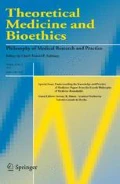Abstract
Questions about information inform many debates in bioethics. One of the reasons for this is that at least some level of information is taken by many to be a prerequisite of valid consent. For others, autonomy in the widest sense presupposes information, because one cannot be in control of one’s life without at least some insight into what it could turn out to contain. Yet not everyone shares this view, and there is a debate about whether or not there is a right to remain in ignorance of one’s medical, and especially genetic, information. It is notable, though, that this debate leaves unexamined the assumption that, if a person wants information, he is entitled to it. This paper examines the assumption, specifically in relation to genetics, where learning facts about oneself may reveal facts about other people, particularly one’s close relatives. This may be taken as a violation of their privacy, and since privacy is something that we normally think should be respected, it is worth asking whether one ought to abjure the opportunity to obtain genetic information for the sake of privacy. In effect, there may be an argument to be made not just for a right to remain in ignorance, but for a duty to do so.
Similar content being viewed by others
Notes
I leave aside questions of blame; if the practitioner does not know of Terry’s existence, his violation of privacy can hardly be blameable. If Gerry learns something that he had not set out to learn, he, too, cannot be blamed any more than I could be blamed for accidentally seeing someone type their PIN into the cash-machine. Nevertheless, while neither has to be blameable, both could be.
I am grateful to an anonymous reviewer for suggesting this analogy.
On this note, I am sympathetic to Takala’s claim that ‘[i]f we do not know about the defects lurking in our genetic makeup we are not strictly speaking harmed by the lack of knowledge [since t]he defects are there whether we know it or not’ [3, p. 490]. But I think it also misses the fairly workaday claim that we ought to prevent harm where possible, quite aside from our causative role. It is true that ignorance does not cause harm, but that is beside the point at the moment.
Moreover, and for the sake of clarity, it is worth stating that, even if there is a duty to remain in ignorance, it would not necessarily generate a reason to ban genetic tests or anything like that. Just because we have a moral duty not to do something does not mean that such a duty should be legally enforceable.
References
Peake, Mervyn. 1999. Titus Groan. Vol. 1 of The Gormenghast Trilogy. London: Vintage.
Harris, John, and Kirsty Keywood. 2001. Ignorance, information and autonomy. Theoretical Medicine 22: 415–436.
Takala, Tuija. 2001. Genetic ignorance and reasonable paternalism. Theoretical Medicine 22: 485–491.
Takala, Tuija, and Heta Aleksandra Gylling. 2000. Who should know about our genetic makeup and why? Journal of Medical Ethics 26: 171–174.
Asscher, Eva, and Bert-Japp Koops. 2010. The right not to know and preimplantation genetic diagnosis for Huntington’s disease. Journal of Medical Ethics 36: 30–33.
Parker, Michael. 2001. Genetics and the interpersonal elaboration of ethics. Theoretical Medicine 22: 451–459.
Sommerville, Ann, and Veronica English. 1999. Genetic privacy: Orthodoxy or oxymoron? Journal of Medical Ethics 25: 144–150.
Author information
Authors and Affiliations
Corresponding author
Rights and permissions
About this article
Cite this article
Brassington, I. Is there a duty to remain in ignorance?. Theor Med Bioeth 32, 101–115 (2011). https://doi.org/10.1007/s11017-010-9145-x
Published:
Issue Date:
DOI: https://doi.org/10.1007/s11017-010-9145-x



